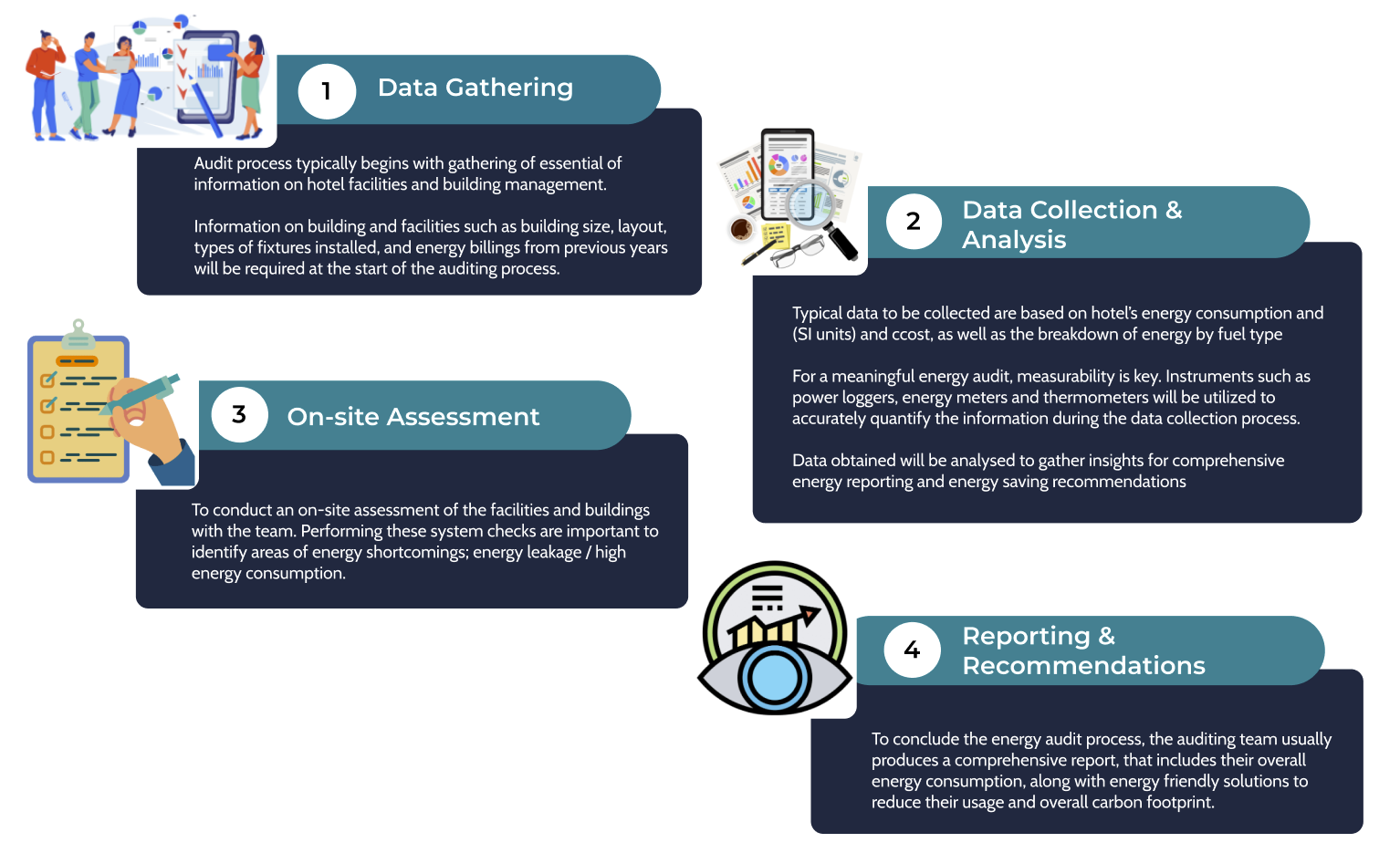
Energy is an essential and important resource in our daily lives, be it at home, work, or play. However, the excessive consumption of energy drives the greenhouse gas emissions within our atmosphere, further aggravating environmental degradation and climate change uncertainties.
With the hotel industry being one of the most energy-intensive within the tourism sector, it is critical to manage and moderate energy usage, and adopt effective solutions that steers us towards conservation of this precious resource.
Our recommended methodology begins with an audit process that, this analyses the current state of energy use within the hotel. The gathered audit insights are imperative in highlighting areas of concerns with high energy consumption. Once these energy hotspots have been determined and clearly identified, hotels are able to develop and construct solutions to manage energy consumption with efficacy.
These solutions include:
|
| Solutions: Retrofit and/or installation or energy efficient equipment or technologies |
| Educate: Active educational engagements with staff and guests on energy conscious behaviors | |
| Monitor and Review: Implement smart energy management information systems to monitor and manage energy consumption in a structured manner to achieve efficiency improvements |
Integrating measures to conserve energy is a key step to ensuring sustainable business practices for hotels.
Global Best Practices
General Audit
Conducting an audit is like plunging in for a deep dive, this process probes the overall usage of energy in hotels and highlights energy hotspots that requires urgent management. For an energy intensive sector like hotel industry, an audit will provide valuable insights for an effective operational management.
An audit requires assessments in multiple areas of the organisation to get a good grasp of how the existing systems interact with each other. It is also the first analytical step for an organization to have a better understanding of their current state. Though extensive, the audit remains a critical process.
A well-performed audit could therefore be effective in targeting areas of key concerns and facilitate hotels in achieving their sustainable goals. Typically, an audit process consists of a few main steps. Some of these steps may vary in different industries and sectors, however, the general flow remains the same.

Hotels can consider engaging professionals such as BCA-registered Energy Auditors who specialize in carrying out such energy audits.
The list of BCA-registered Energy Auditors can be found here: BCA Energy Auditor Scheme | Building and Construction Authority (BCA)
Solutions
Based on the audit insights gathered, hotels can identify opportunities to deploy a variety of solutions to achieve higher energy efficiency. This includes well-considered retrofits on fixtures, systems and equipment, raising hotel staff and guests’ awareness through education, and the implementation of energy management systems to track, monitor and review their energy consumption levels.
Here are some of the common solutions for energy reduction. Do note that the list provided is non-exhaustive.
Hotels can also work with energy auditors to identify more reduction measures specific to the hotels’ operations and facilities.





Regular maintenance of ACMV systems, lighting fixtures, and other energy-consuming equipment can significantly improve their efficiency, resulting in reduced energy consumption and lower utility bills.
Furthermore, regular maintenance can help hotel operators to identify and repair equipment with deteriorating performance or leaks that can contribute to over consumption of energy. For instance, a small air leak in an ACMV system can cause the equipment to work harder and consume more energy to maintain a comfortable temperature. By regularly inspecting and repairing equipment, hotels can identify and address these issues early, leading to greater energy efficiency and cost savings.

For hotels that are planning or undergoing renovation that involves in building façade upgrade, it is an excellent opportunity to examine on how to enhance building façade to improve energy efficiency.
Some areas that hotels can look at:
Education
Case Studies
International
Hilton Worldwide Holdings Inc. - Monitoring

According to the Hilton 2022 Global Trends report, a significant majority of travelers - 86% - expressed a desire to travel in a more sustainable manner. In response, Hilton is committed to promoting sustainable travel across the globe.
In 2009, Hilton launched LightStay, a custom-built proprietary system designed to monitor and track environmental performance at its hotels. Over time, the system has evolved to measure, manage, and report on all of Hilton's environmental and social metrics.Real-time dashboards and monthly updates keep properties regularly informed of their ESG performance.
Since the launch of LightStay, Hilton properties have made significant strides in reducing their carbon emissions, equivalent to removing 390,350 cars from the road, and have contributed 6,273,934 volunteer hours to their local communities. Additionally, the system has helped the company save over $1 billion in utility costs. Through the use of LightStay, all properties in Hilton's portfolio have obtained ISO 9001 (Quality Management), ISO 14001 (Environmental Management), and ISO 50001 (Energy Management) certifications.
In addition to tracking energy, carbon, water, and waste data, LightStay also captures information on Hilton properties' operational practices and sustainability certifications, as well as social impact metrics such as career opportunities, donations, and volunteer hours. The system also provides localized risk indices on issues that are most material to the company, such as disaster vulnerability, water risk, and modern slavery risk, to inform each hotel's priorities.
Since the launch of LightStay, Hilton properties have made significant strides in reducing their carbon emissions, equivalent to removing 390,350 cars from the road, and have contributed 6,273,934 volunteer hours to their local communities. Additionally, the system has helped the company save over $1 billion in utility costs. Through the use of LightStay, all properties in Hilton's portfolio have obtained ISO 9001 (Quality Management), ISO 14001 (Environmental Management), and ISO 50001 (Energy Management) certifications.
For more information regarding the LightStay implementation in Hilton, you could check out page 14 of Hilton’s 2022 Environmental, Social and Governance Report.
References: Your Eco‑Friendly Trip Just Got Easier in 2022 (hilton.com) | Hilton 2022 Trends Report (ceros.com) | Hilton LightStay Standard is Now a GSTC-Recognized Standard | GSTC (gstcouncil.org) | LightStay – A Decade of Managing our Environmental and Social Impact | Stories From Hilton
Local
Grand Hyatt Singapore - Retrofit

This case study has demonstrated a well-planned combination of energy management systems, sustainability metric tracking systems, chiller plant replacement and trigeneration plant has optimized Grand Hyatt Singapore’s overall energy efficacy.
Grand Hyatt Singapore replaced central AC plant in 2022, with “Total System and Right Sizing Approach”. This has the highest efficiency within the tropics. In addition, Grand Hyatt Singapore installed gas-powered Trigeneration Plant, capable of redirecting waste heat while generating electricity. This provided the heating and chilling needs for laundry and air-conditioning. Trigeneration Plant proves its efficacy with the production of 1 million kWh of electricity, and this equates to 10% of current total electricity produced in Grand Hyatt.
Since 2022, with the implementation of Green Energy Management Systems and Hyatt Ecotrack, Grand Hyatt hotel has achieved impressive reduction in their overall consumption. These monitoring systems specifically track sustainability metrics such as greenhouse gas emissions, energy, water, waste and more.
This highlights the importance of implementing systems that will continue to monitor usage to continuously improve efficiency of hotel’s operations and sustainability goals.

Resorts World at Sentosa (RWS) - Renewable Energy

RWS’s decarbonizing journey requires a combination of effective strategies such as overall energy reduction, the use of renewables, and technology innovation. For RWS to achieve the goal of carbon neutrality by 2030, they actively explore new frontiers and adopt good practices where energy can be significantly reduced, and some initiatives are illustrated below.
Renewable Energy
Due to our geographical location, Singapore has limited capacities and options for renewable energy due to geographical constraints.
Currently, RWS has been progressively deploying solar panels on rooftop areas of buildings, including Universal Studios Singapore and hotel properties, substantially quadrupling RWS’ overall solar energy.
On top of that, RWS also regularly explores partnerships with technology experts and research institutions to further their decarbonisation agenda, such as building-integrated photovoltaics (BiPV) that could be integrated into new infrastructures to generate electricity for on-site purposes. RWS has also worked with a partner to commence a trial on generating clean energy from a tidal turbine beneath Sentosa Boardwalk . If successful, RWS will consider implementing this as another alternative source of clean energy.
Building Management System (BMS)
Effective management of energy is extremely important for a large-scale resort like RWS. Therefore, they have commissioned the installation and implementation of the first large-scale Cloud-Based Building Management System (BMS) in Singapore. This helps to provide and increase connectivity, energy optimization and detect and diagnose energy disruptions.
Existing BMS system has been facilitating in the identification of areas for improvement and energy optimization. Along with other initiatives, there has been positive 38% reduction of energy consumption in comparison to 2015 baseline study.
The solar panel installation will be completed by 2023, and it is projected to generate 3.3 MWh of clean energy each year. Together with the new BMS system, it is looking to drive energy reduction by up to 4GWh annually (equivalent to 10,588 four-room HDB flats).
Upon completion, the new cloud BMS will achieve up to 4GWh energy savings annually for RWS while maintaining guest thermal comfort level in Singapore’s tropical climate. This is equivalent to the energy use of over 880 4-room HDB flats per year.
PARKROYAL COLLECTION Marina Bay - Renewable Energy

To reduce their environmental impact from the use of energy, PARKROYAL COLLECTION Marina Bay has installed solar panels on the hotel’s rooftop to generate renewable energy, implemented fibre optic lights in the hotel’s swimming pool and deployed the use of electric vehicles.
The 210 solar panels installed on the hotel’s rooftop can generate more than 350 kWh of renewable energy daily, which is sufficient to power 540 typical households in Singapore per month. The electricity generated is more than enough to run the hotel’s 13 passenger lifts and emergency lightings, reducing the overall electrical consumption by about 1.4%. The lifespan of the solar panels can last from 25 to 30 years. In terms of finances, PARKROYAL COLLECTION will be able to recoup its investment after 4.5 years and enjoy savings of SGD 21,900 per year, otherwise spent on electricity.
At dusk, the hotel’s swimming pool comes alive with 1,380 glowing fibre optic lights. The benefit of installing fibre optic lights is that they consume about 13,140 kWh of energy per year, which is much lower compared to the standard swimming pool lights, that consume approximately 18,000 kWh of energy per year.
In addition, PARKROYAL COLLECTION Marina Bay has its very own electric car, manufactured by BYD (Build Your Dreams) to ferry their guests. It is powered by an advanced battery pack that is safe and recyclable, and it can travel 400km with a single charge, producing less noise and virtually no pollutants. This has enabled the hotel to reduce their carbon emissions.
These initiatives have become the key highlights when the hotel conducts sustainable hotel building tours for members of the press and the public. To date, the hotel has conducted “educational” tours for more than 300 students and members of the public.
Monitor & Review
On the topic of energy efficiency, monitoring is vital for hotels in improving energy efficiency and lowering overall carbon footprint and business costs. To increase and maintain energy efficacy, the implementation of a building management system is critical in capturing accurate live data for insight analysis. With real-time insights and frequent checks on data meters, it increases respond speed and reduces time required for maintenance which in turn helps to raise operational productivity within hotels. Several other advantages include:
Several other advantages include:
